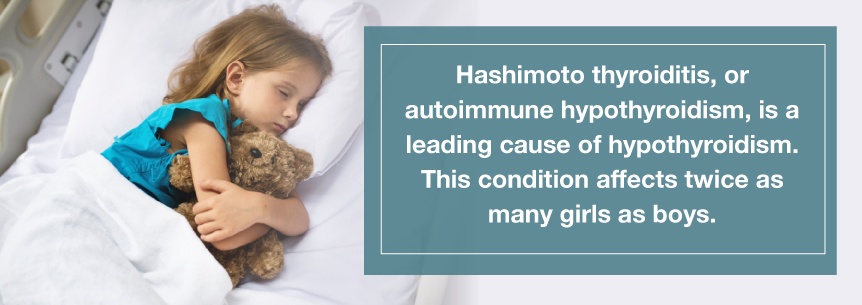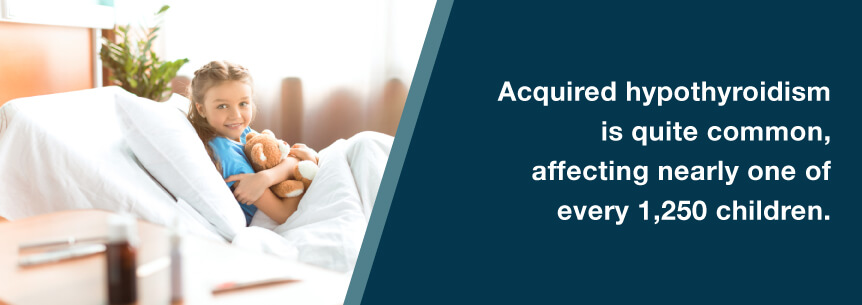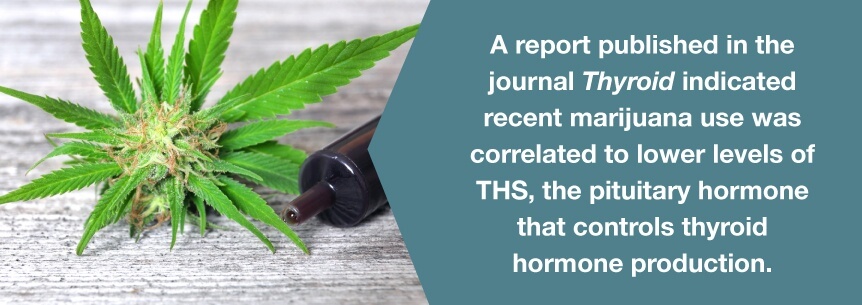The symptoms of acquired hypothyroidism, such as fatigue and lack of energy, can take a toll on your child’s quality of life. Luckily, treatment options, including medical marijuana, can help alleviate these symptoms and help your child feel more like themselves again. As a parent, the more you understand the condition, the better able you are to make informed decisions about how to manage acquired hypothyroidism in your child.
Hypothyroidism is a disorder where the thyroid glands do not produce adequate thyroid hormones. If this condition is present at birth, it’s called congenital hypothyroidism. When hypothyroidism develops after birth, often later in childhood or adolescence, it is called acquired hypothyroidism. Acquired hypothyroidism can affect children of any age and is the most common type of thyroid disorder affecting children.
Left untreated, acquired hypothyroidism may:
Most children with this condition require treatment for the remainder of their lives.
The most common symptom of acquired hypothyroidism a goiter. Pediatric doctors discover the goiter as part of a physical exam. The goiter is an abnormal enlargement of the thyroid gland.
Children who have acquired hypothyroidism may experience a variety of other symptoms, including the following:
Every child is different. Your child may experience only a handful of these symptoms. If your child displays one or more of these symptoms, however, you should consider visiting your pediatrician to discuss your concerns. The sooner your pediatrician diagnoses acquired hypothyroidism, the faster treatment for your child can begin.
This condition is usually diagnosed through blood tests for TSH (thyroid stimulating hormone) and free T4 (free thyroxine) if there is a suspicion of hypothyroidism or other thyroid problems. In other cases, physicians use thyroid ultrasonography to diagnose acquired hypothyroidism as well as radionuclide scans.
Hashimoto thyroiditis, or autoimmune hypothyroidism, is a leading cause of hypothyroidism. This condition affects twice as many girls as boys. Nearly half of all patients have a family history of autoimmune hypothyroidism.

Aside from Hashimoto thyroiditis, two primary causes of acquired hypothyroidism involve damage to the thyroid, of course, or damage to the pituitary gland. The thyroid gland produces thyroid hormones, but the pituitary gland controls that production. Thyroid damage often results from autoimmunity, surgery or radiation while pituitary damage often follows severe brain injuries or radiation.
Some medications may also interfere with thyroid hormone production, as well as certain substances, including too much or too little iodine in your child’s diet. Your doctor will work to identify the precise cause of acquired hypothyroidism in your child to devise an effective treatment for your child quickly after diagnosis.
In addition to the many physical effects of acquired hypothyroidism, the condition may affect your child on an emotional level as well. In a world where conforming to the norm and fitting in are so important to children and teens, the mental effects of acquired hypothyroidism can be even more problematic. It can lead to depression, anxiety and feelings of isolation among the children who have acquired hypothyroidism.
The condition can make it difficult to concentrate, leading to issues in learning environments with other children as well as bouts of frustration. You may notice these effects while you work with your pediatrician to find the best doses of medication for your child’s acquired hypothyroidism needs.
Therefore, if your doctor diagnosed your child with acquired hypothyroidism, be on the lookout for symptoms of depression or potential performance or behavioral problems at school. This means as a parent, you should closely observe your child not only for the physical effects of acquired hypothyroidism, but also the emotional repercussions of the condition as well.
The below statistics may help shed some light on the nature and prevalence of acquired hypothyroidism among today’s children and teens.

It wasn’t until 1850 that medical publications first described hypothyroidism, according to the Journal of Thyroid Research. However, medical professionals introduced the first effective treatment for the condition less than 50 years later. Another 50 beyond, researchers discovered autoimmune thyroiditis was the most common cause of hypothyroidism.
Even though there are highly effective treatments today, research continues to search for a possible cure so that patients don’t have to take medications every day of their lives.
Washington University at Saint Louis released a pediatric endocrinology fact sheet reporting the synthetic thyroid hormone Levothyroxine is the main treatment used for hypothyroidism.
The child usually must take this once-daily pill for life. It has very few side effects, and, in the rare cases when side effects do occur, they are often the result of overtreatment. For this reason, physicians will test blood six to eight weeks after treatment begins to see how well your child’s hormone levels have adjusted with medical intervention.
Contact your physician if your child exhibits any of the below signs potentially indicating the current dose of Levothyroxine is too high for your child:
You should maintain consistent doses of the medication your child is prescribed and never change or omit doses without a physician’s instructions to do so. Additionally, consider contacting your physician if your pharmacist switches brands from the medication you normally use.
Your child may need to take his or her medication with an empty stomach and must avoid ingesting it with foods containing soy or medications containing iron.
Remember, your child’s dosage needs will change as he or she grows. Your child will continue to need regular doctor visits throughout childhood and adolescence – even into adulthood.
The latest study reveals that only the combination of treatments involving Levothyroxine plus Levo-triiodothyronine serves to normalize all thyroid hormone-dependent measures, which include serum and tissue T3 levels, according to a study documented by the U.S. National Library of Medicine.
Recent genetic studies open the possibility of pharmacogenomic treatments, which involve how genes affect an individual’s response to drugs to treat acquired hypothyroidism. Future genetic studies may help in identifying the subcategory of patients with acquired hypothyroidism who could benefit from combination therapy.
Studies have been conducted to further our knowledge on acquired hypothyroidism and how cannabis might be able to treat it.
For example, a 2009 report published in the journal Endocrinology highlighted the potential ability of CBD to activate thyrotropin-releasing, hormone-synthesizing, axons between the central nervous system and thyroid gland.
Likewise, a study published in the European Journal of Endocrinology in 2002 showcased evidence of functional CB receptors in the thyroids of rats, with the ability to adjust the release of both T3 and T4 hormones. The study revealed a 30 percent hormone release reduction within four hours of administration of the active cannabinoid.
Further, a report published in the journal Thyroid indicated recent marijuana use was correlated to lower levels of THS, the pituitary hormone that controls thyroid hormone production.

While more research is needed, these studies highlight the potential CBD may have to both suppress an overactive thyroid and promote hormone release in underactive thyroid glands.
In addition to potentially helping with thyroid underactivity, some symptoms of cannabis and acquired hypothyroidism treatment can help with including the following:
Certain marijuana strains can help with the symptoms of acquired hypothyroidism. Below are some recommended strains for each particular symptom. Work with your experienced budtender or qualified medical marijuana physician to find the best strain or strains for you.
Cannabinoids have anti-inflammatory qualities that help reduce the inflammation process. Also, cannabinoids contain beta-caryophyllene, a plant terpene used for inflammatory diets. Therefore, they help stop inflammation. Some good strains in this category include:
For a long time now, individuals have been using marijuana to treat depression. Studies have been documenting its ability to heighten your mood and provide energy. Weed’s cannabinoids react with your endocannabinoid receptors inside your body. And, many of these receptors impact your mood directly, meaning simply by using marijuana, you can alleviate your depression and cause a better outlook. Some good depression strains include:

Older studies show certain medical cannabis components, particularly cannabidiol (CBD), help manage your brain’s GABA levels. Medical weed has also been shown to lower cortisol levels. Cortisol is a stress-indicating hormone. And, when your cortisol levels are lowered, it generates a dulled stress reaction. Researchers are still trying to determine if this is an overall good reaction. Some good strains for anxiety are:
Any type of sativa or sativa-dominant strain is good for energy. However, some recommended energy-producing strains include:
There are almost limitless marijuana strains, and there are also plenty of methods of use to obtain its effects. Smoking marijuana may not be the best method for you because of potential health lung effects. It also has side effects including coughing and burning feelings in your throat.
Therefore, some other ways to take cannabisv, which might be better for you, include:
Vaping offers convenience, while cannabis beginners might prefer edibles.
Not every state at this point has legalized marijuana for medicinal or recreational purposes, but many have. Therefore, check with your state to see if you qualify for this medicinal herb for you or your child’s acquired hypothyroidism symptoms. Here at Marijuana Doctors, we can help you find out if you qualify and answer your questions. We’ll also connect you with a cannabis doctor who can help get you started on your medical cannabis treatment for acquired hypothyroidism once you find out if you do qualify.
Find A Doctor Find A Dispensary